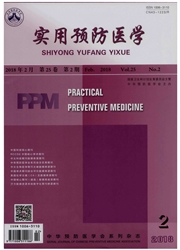

 中文摘要:
中文摘要:
目的了解辽宁省沈阳市农村留守居民生命质量状况及其影响因素,为采取干预措施提供参考依据。方法采用多阶段分层随机抽样方法对在沈阳市东陵区和沈北新区抽取的514名农村留守居民生命质量状况进行面访调查。结果沈阳市农村留守居民生命质量总平均分为(632.2±131.9)分,生理健康因子平均分为(310.7±78.9)分,心理健康因子平均分为(321.5±65.1)分;不同特征农村留守居民生命质量得分比较,不同性别、年龄、文化程度、年人均收入、患慢性病和债务负担情况的农村留守居民生理健康因子、心理健康因子得分和生命质量总分间差异均有统计学意义(P〈0.05),吸烟居民生理健康因子得分高于不吸烟居民(t=-2.057,P=0.04);多元线性逐步回归分析结果表明,女性、患慢性病和有债务负担的农村留守居民生理健康因子、心理健康因子得分和生命质量总分较低;年龄越大,农村留守居民的生理健康因子得分和生命质量总分越低。年人均收入越高,农村留守居民生理健康因子、心理健康因子得分和生命质量总分越高;文化程度越高,农村留守居民心理健康因子得分越高。结论沈阳市农村留守居民生命质量较差,性别、年龄、文化程度、年人均收入、患慢性病和债务负担是沈阳农村留守居民生命质量的主要影响因素。
 英文摘要:
英文摘要:
Objective To evaluate the quality of life(QOL) among left-behind rural residents and to explore its main influencing factors in Shenyang mumicipality.Methods Through multistage stratified sampling method,the quality of life in 514 left-behind rural residents in Shenyang was assessed with the 36-Item Short Form Health Survey(SF-36) VersionⅡ.Results The average total score of QOL was 632.2±131.9 for the left-behind rural residents(668.5±105.6 for male and 617.3±138.7 for female).The average score of physical component summary(PCS) was 310.7±78.9(332.6±64.6 for male and 301.7±82.5 for female).The average score of mental component summary(MCS) was 321.5±65.1(335.8±53.3 for male and 315.6±68.6 for female).Univariate analysis showed that QOL of the left-behind rural residents was significantly associated with gender,age,education,income,chronic diseases,and debt(P0.05).The PCS score of the smokers was higher than that of non-smokers(t=-2.057,P=0.04).Multiple stepwise linear regressions showed that chronic diseases,debt,female,and age were inversely correlated to QOL,and income and education were positively correlated to QOL among the left-behind rural residents.Conclusion The QOL among left-behind rural residents in Shenyang city is not good and the main influencing factors of QOL are gender,age,education,chronic diseases,debt,and income among the residents.
 同期刊论文项目
同期刊论文项目
 同项目期刊论文
同项目期刊论文
 期刊信息
期刊信息
